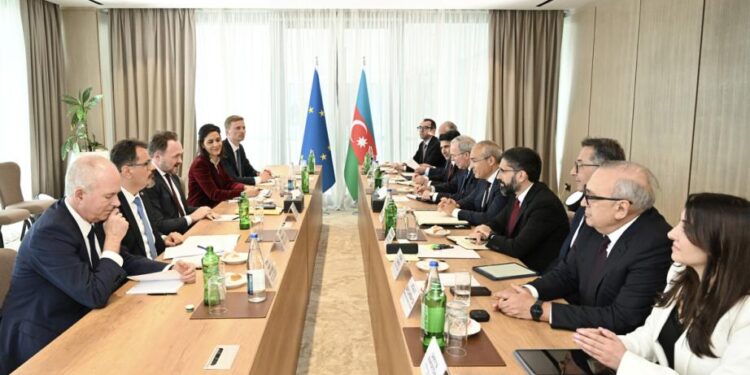Baku – Azerbaijan and North Macedonia are intensifying efforts to strengthen their energy partnership, exploring new avenues for cooperation to enhance mutual benefits and regional energy security. During recent diplomatic engagements, officials from both countries discussed expanding collaboration across various energy sectors, signaling a shared commitment to deepen ties amid evolving global energy dynamics. The developments were highlighted by Az…ôrtac, Azerbaijan’s state news agency, underscoring the strategic importance of the energy dialogue between the two nations.
Azerbaijan and North Macedonia Deepen Strategic Energy Partnership
The governments of Azerbaijan and North Macedonia are intensifying efforts to expand their cooperative framework in the energy sector, reflecting mutual commitment to enhance regional energy security and sustainability. Recent high-level talks have focused on diversifying energy sources and strengthening infrastructure, aiming to leverage Azerbaijan’s rich hydrocarbon resources in support of North Macedonia’s growing energy demands. Collaboration is also set to explore renewable energy projects and knowledge exchange in cutting-edge technologies.
Key areas of development include:
- Expansion of natural gas supply routes to North Macedonia
- Joint investments in solar and wind energy initiatives
- Technical training programs for energy sector professionals
- Strengthening of bilateral energy trade agreements
| Project Focus | Target Year | Benefits |
|---|---|---|
| Gas Pipeline Expansion | 2025 | Increased supply capacity |
| Renewable Energy Parks | 2027 | Reduced carbon footprint |
| Technical Exchange Programs | 2024 | Enhanced energy expertise |
Opportunities and Challenges in Expanding Bilateral Energy Cooperation
The growing dialogue between Azerbaijan and North Macedonia signals a promising avenue for strengthening energy ties, yet it comes with a unique set of complexities. As both nations look to diversify energy sources and enhance regional stability, strategic investments in infrastructure and technology emerge as key drivers. Opportunities abound in the development of renewable energy projects, natural gas transit capabilities, and joint research initiatives aimed at increasing energy efficiency. Additionally, cooperation can foster deeper integration within broader European energy markets, aligning both countries with EU energy directives and sustainability goals.
However, several challenges remain pivotal to this bilateral advancement. These include:
- Geopolitical sensitivities: Navigating regional alliances and competing interests demands careful diplomacy.
- Financial constraints: Securing stable funding for large-scale projects is essential amid fluctuating global energy prices.
- Regulatory alignment: Harmonizing national policies and legal frameworks can be time-consuming yet critical for seamless cooperation.
To better illustrate the balancing factors at play, the table below summarizes core opportunities alongside the corresponding challenges faced by both countries in this expanding partnership.
| Opportunities | Challenges | |||||||||||||||||
|---|---|---|---|---|---|---|---|---|---|---|---|---|---|---|---|---|---|---|
| Expansion of renewable energy projects | High initial capital investment | |||||||||||||||||
| Access to transit routes for natural gas | Complex geopolitical landscape | |||||||||||||||||
| Joint research and technology exchange | Need It looks like your table was cut off at the last challenge for the “Joint research and technology exchange” row. Here’s a completion and a clean summary for that section: | |||||||||||||||||
| Joint research and technology exchange | Need for regulatory alignment |
| Policy Area | Proposed Action | Expected Impact | ||||||||||||||||
|---|---|---|---|---|---|---|---|---|---|---|---|---|---|---|---|---|---|---|
| Legal Framework | Tax incentives & regulatory clarity | Increased renewable investments | ||||||||||||||||
| Joint R&D | Shared innovation hubs | Accelerated technology adoption | ||||||||||||||||
| Capacity Building | Technical training programs |
| Policy Area | Proposed Action | Expected Impact |
|---|---|---|
| Legal Framework | Tax incentives & regulatory clarity | Increased renewable investments |
| Joint R&D | Shared innovation hubs | Accelerated technology adoption |
| Capacity Building | Technical training programs | Enhanced sector expertise |
| Cross-Border Trade | Energy trade agreements | Grid stability & resource optimization |
| Public-Private Partnerships | Co-financing sustainable infrastructureIn Conclusion As Azerbaijan and North Macedonia continue to deepen their energy ties, both nations stand poised to enhance regional energy security and foster economic growth. The ongoing dialogue and potential agreements signal a promising chapter in bilateral cooperation, reflecting a shared commitment to diversifying energy sources and strengthening strategic partnerships. Stakeholders and observers alike will be watching closely as these developments unfold, shaping the future landscape of energy collaboration in the region. ADVERTISEMENT |
















